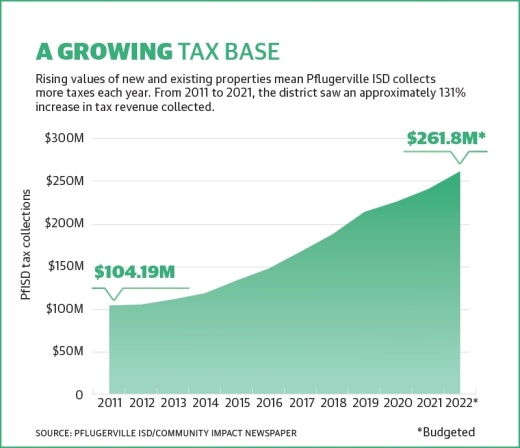According to the Travis County Appraisal District, the median taxable value of a home in Pflugerville ISD went up from $257,557 in 2021 to $287,944 in 2022, an 11.8% increase.
However, PfISD Superintendent Doug Killian said the rising property values have created more problems for the district than they have solved.
“[High property values have] exactly the opposite effect of what you’d think for our school finance,” Killian said. “The more property wealthy we are, the less state aid we receive—we just collect more of it local.”
This is because of the way school finances work in Texas: Each district is allocated a set amount of funding based primarily on its attendance, and the state provides funding to make up the difference after property tax revenue.

Since PfISD’s enrollment is not increasing at the same rate as its property values, Killian said the district does not have much more money to work with than it did before—it just has to cover more expenditures using its own property taxes.
“If we don’t see a large number of students as well, ... we won’t get any wealthier,” Killian said. “We won’t have any extra money to do pay raises or anything.”
Several other factors present financial challenges for the district as well, including ongoing staffing shortages, the failure of its tax ratification election last November and the general financial stresses that come with inflation.
All those factors together account for the nearly $10 million shortfall projected in the district’s budget for the upcoming fiscal year, he said.
However, Killian said if the trend of property value growth outpacing enrollment growth continues, the district is headed toward another challenge: recapture.
Recapture
When a school district reaches a certain threshold of property value per student, it enters what is called recapture, according to PfISD Chief Financial Officer Jennifer Land.
When in recapture, rather than receiving money from the state, a district must send its excess tax revenue to the state.
Money sent to the state via recapture is purportedly used to assist less property-wealthy school districts, earning the program the nickname “Robin Hood,” according to the Texas Education Agency.
Land said PfISD is what is called a “gap district,” a district that is considered property wealthy but does not quite meet the requirements for recapture. She said she expects PfISD to enter recapture within the next two to five years.

Land said it is difficult to predict the precise impact entering recapture would have, but the state would likely take between 2%-10% of the district’s tax revenue.
“If we look 20-30 years out, I think ... over half of the school districts in Texas would be in recapture if nothing changes,” Land said.
Killian identified two potential sources of relief for the district. The first is through a voter approval tax ratification election, or VATRE.
A VATRE would allow the district to convert some of its tax revenue to maintenance and operations tax, which is not subject to recapture.
According to Killian, however, a more lasting solution will have to take place at the state level.
Killian said he would like to see an increase in the amount of funding per student a district is allowed to raise before going into recapture as well as a change to determine the allotment based on enrollment instead of attendance.
Attendance has diminished over the last two years because of COVID-19, and Killian said the district is taking a financial hit for encouraging sick students to stay home.
“The system is very antiquated,” Killian said. “Especially in light of a pandemic, it doesn’t work.”





